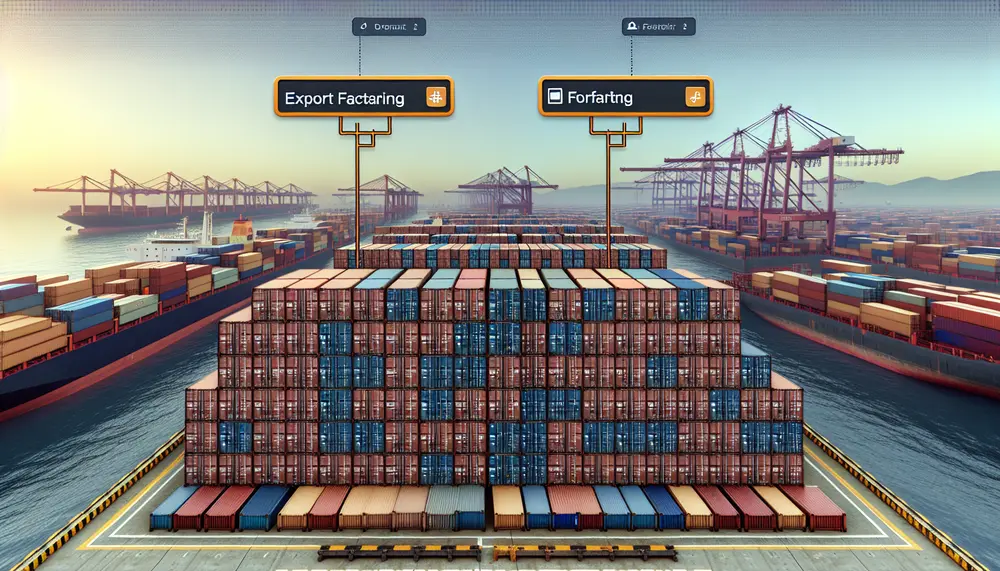Trade finance
Trade finance
Understanding Trade Finance
Trade finance represents the financial instruments and products that are used by companies to facilitate international trade and commerce. Trade finance makes it possible and easier for importers and exporters to transact business through trade. It is a key factor in the movement of goods at a global level and helps businesses manage the cash flow, payment delays, and the risks associated with international trade.
The Role of Trade Finance in Financial Factoring
In the context of financial factoring, trade finance plays a vital role by providing a form of financing that helps companies free up capital tied in accounts receivables. Importers and exporters use factoring services to gain immediate cash from their open invoices, instead of waiting for the standard 30, 60, or even 90 days for payment. This swift access to funds improves cash flow, enabling businesses to maintain a steady flow of capital and to invest in growth opportunities.
How Trade Finance Works
Here's how the process often unfolds: a business sells its accounts receivable (the money owed to it by customers) at a discount to a factoring company. The factoring company gives the business an advance payment, typically 70%-90% of the invoice value, providing liquidity. When the business's customer pays the invoice, the factoring company collects the payment and disburses the remaining balance to the business, minus a fee for the service.
Benefits of Trade Finance
Trade finance through factoring offers numerous benefits, including improved cash flow, reduction of payment risk, and the ability to manage credit more effectively. These advantages help businesses, especially small and medium enterprises (SMEs), to compete in the global market where more established firms may have deeper financial pockets.
Trade Finance and Risk Mitigation
One of the biggest hurdles in international trade is the risk associated with cross-border transactions. Trade finance tools, like letters of credit and trade credit insurance, provide a safeguard against such risks. They ensure that exporters receive payment, even if the importer defaults, thus mitigating credit risk and enhancing trading relationships.
Conclusion
Understanding trade finance is crucial for businesses engaged in international trade. It offers a variety of solutions structured to support importers and exporters by optimizing working capital, reducing financial barriers, and mitigating risk. For companies looking to expand their global footprint, leveraging trade finance can offer a clear path to sustainable growth.
Blog Posts with the term: Trade finance

Reverse factoring, or supply chain financing, is a financial arrangement where a buyer facilitates funding for its suppliers through a third-party institution to enhance supplier cash flow and optimize payment terms. This setup not only improves operational efficiency and strengthens...

The article discusses how technological innovations, particularly digital platforms, AI, and blockchain, are transforming factoring and trade finance by enhancing efficiency, transparency, and accessibility. These advancements help businesses streamline operations, improve cash flow management, reduce costs, and gain a competitive...

Export factoring is a financial service where businesses sell their invoices to a factor for immediate capital, enhancing cash flow and transferring credit risk in international trade. Forfaiting involves selling longer-term receivables to a forfaiter who assumes all risks, turning...

An Export Factoring Agreement is a financial arrangement where exporters sell their invoices to a factor for immediate cash, easing cash flow and mitigating non-payment risks. It includes services like credit protection, invoice management, and fund advancement; terms vary widely...

Factoring is a financial transaction where businesses sell their accounts receivable to a third party at a discount for immediate cash flow, while still needing to manage VAT implications carefully. The interaction between factoring and VAT affects the timing of...

The Factoring Regulation Act 2011 in India provides a legal framework for factoring services, aiming to regulate the industry and protect stakeholders by requiring companies to register with the RBI and adhere to specific guidelines. It enhances liquidity for businesses,...

Export factoring provides immediate cash by selling accounts receivable to a factoring company, enhancing liquidity and mitigating international trade risks. It offers benefits like improved cash flow without increasing debt levels, competitive trading terms, credit protection, and saves time on...

Reverse factoring, also known as supply chain financing, is a financial solution that helps businesses in India manage cash flow by allowing suppliers to receive early payments from financial institutions based on buyer approval. This method benefits both buyers and...

Reverse factoring, also known as supplier finance, helps companies manage payables and improve cash flow by having a financial institution pay suppliers' invoices early. Invoice discounting allows businesses to gain immediate cash by selling their outstanding invoices at a discount...

Export factoring without recourse is a financial service where exporters sell their invoices to a factor who assumes all credit risks, ensuring the exporter gets paid even if the overseas customer defaults. This arrangement boosts cash flow and reduces administrative...

This article provides a beginner's guide to understanding traditional finance and factoring, explaining their differences, advantages, and disadvantages. Traditional finance includes loans and credit lines with stringent criteria that may affect debt ratios, while factoring offers quick cash flow by...

HSBC’s reverse factoring solutions help businesses optimize cash flow, support suppliers with early payments, and strengthen supply chains through tailored, tech-driven services. With global expertise, local support, and advanced digital tools, HSBC ensures transparency and efficiency for companies of all...

Factoring in corporate finance allows businesses to sell their invoices at a discount for immediate cash flow, providing liquidity and managing accounts receivables efficiently. It offers advantages over traditional financing by improving cash flow without accruing debt or requiring collateral,...

Export factoring is a financial tool used in international trade where companies sell their accounts receivable to a factor for immediate cash, improving liquidity and mitigating risks like customer insolvency. It offers benefits such as reduced administrative costs, access to...
